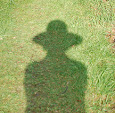Flowers are without hope.
Because hope is tomorrow and flowers have no tomorrow.
By Antonio Porchia, Voces, 1943, translated from Spanish by W.S. Merwin

These flowers were given to me by Mairi and they are now in their second week gracing the front entrance of Larchfield. (The vase is Iain's mother's from years ago and suits the architecture here.)
However it all got me thinking of the book that was being read on the radio last week: Don't Sleep, There are Snakes by Daniel Everett. It basically comes into the category of ethnography and linguistics.
 The book is on Amazon here. The Guardian review of it is here .
The book is on Amazon here. The Guardian review of it is here .
However it all got me thinking of the book that was being read on the radio last week: Don't Sleep, There are Snakes by Daniel Everett. It basically comes into the category of ethnography and linguistics.
 The book is on Amazon here. The Guardian review of it is here .
The book is on Amazon here. The Guardian review of it is here .It is about a man who, with his young family, in 1977 lived with a hunting and gathering tribe, the Pirahãs, in the Amazon. His plan was to learn Pirahã so that he could translate the Bible. It took many years. He found them a happy, contented people but it is the dealing with the language that is most interesting.
Anthony's Guardian article states "We may all have the natural cognitive skills to derive meaning from language, but what determines the shape of the language, its basic architecture, is the surrounding culture." Pirahãs have little interest in that which they cannot directly verify. (Sounds a bit like scientists I have spoken to!)
There is lots of food for thought here. For example, the author of the book talked about how they basically live in the here and now. Is it that they have no concept of past and future? They do not have a word for "worry" for example! So that brings me back to where I started:
Anthony's Guardian article states "We may all have the natural cognitive skills to derive meaning from language, but what determines the shape of the language, its basic architecture, is the surrounding culture." Pirahãs have little interest in that which they cannot directly verify. (Sounds a bit like scientists I have spoken to!)
There is lots of food for thought here. For example, the author of the book talked about how they basically live in the here and now. Is it that they have no concept of past and future? They do not have a word for "worry" for example! So that brings me back to where I started:
Flowers are without hope.
Because hope is tomorrow and flowers have no tomorrow.




No comments:
Post a Comment